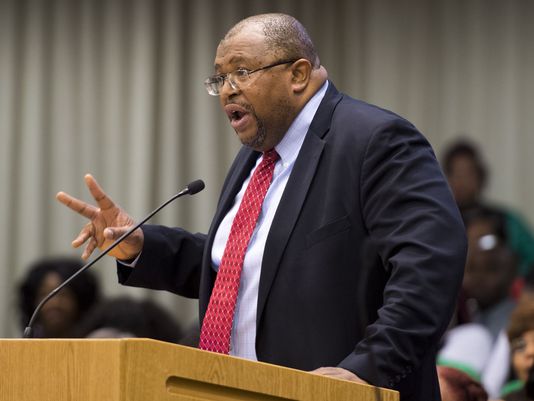October 1, 2018. Knox News.
Eight community organizations are calling on the Knox County Board of Education to retool its strategic plan with specific goals ranging from reducing class sizes to enhancing the diversity of the district’s workforce.
In a 16-page letter the coalition of organizations sent to board members on Sept. 20, it spells out 10 priorities for the district to adopt in its next three-year strategic plan.
A draft of that plan was released in June with input gathered at 11 community meetings held between January and March along with feedback received through an online community survey that drew more than 5,000 responses.
The organizations behind the letter include Justice Knox, Knoxville Branch of the NAACP, Knox County Education Association, Kindred Futures, League of Women Voters of Knoxville and Knox County, Stop School Push Out, Students Parents and Educators Across Knox County, and What’s the Big I.D.E.A.?
Improving schools for all students
The coalition is not opposed to the draft strategic plan, and the groups insist they like a lot about it.
That draft, composed of 30 pages, is largely defined by six strategic goals: increasing student achievement; creating “safe and nurturing environments”; promoting equity, diversity and inclusion; bettering communication between the district and the community; raising up community and family partnerships; and ensuring responsible financial stewardship.
But the plan leaves room for improvement for the greater benefit of students, the letter states.
The coalition takes a detailed approach in outlining concerns as well as recommendations “designed to improve our schools for all students,” said the Rev. John Butler, president of the Knoxville Branch of the NAACP.
Some of their priorities overlap with the pillars of the draft strategic plan, said Courtney Shea, a member of the steering committee for Justice Knox’s education committee.
“But we just wanted to give the board the benefit of our research and analysis,” Shea said.
The organizations’ priorities center on: reducing class sizes; eliminating bullying and harassment at school; ensuring that all students experience diversity, specifically racial and ethnic diversity, at school; eliminating disparities in discipline and suspensions; achieving and maintaining high levels of cultural competency among staff; ensuring that all students have the benefit of the professional mental and emotional health services they need to thrive in school; fully funding all school magnet programs; recruiting and retaining excellent teachers; developing and implementing a plan for providing special education services for students with disabilities; and ensuring transparent program evaluation and budgeting.
For Butler, no priority outweighs another.
“All of them are important for all of our students,” he said.
Some of the specifics
Recommendations for each priority include specific objectives to chase as well as suggestions of metrics for tracking progress.
When it comes to ensuring transparent program evaluation and budgeting in the district, the groups detail a timeline of when it would like to see the district progress with program evaluations and budgeting for the 2020-21 school year, starting in October 2019.
In addition to seeing that district administration notifies board members of programs or activities facing termination or a reduction of more than 10 percent in the next year by Oct. 1, the group wants administrators to inform board members of potential new programs and their costs.
The coalition proposes that by Nov. 1, the administration offers the board analyses for chopping or adding programs and that by Dec. 1, the administration will have “a preliminary budget that fully funds all programs and activities that are necessary (to) provide an excellent education to every KCS student and comply with all state and federal laws.”
By Feb. 1, the administration will have ready for the board “a recommended budget request,” and during its February regular meeting board members should approve and pass along to the County Commission their funding request.
That timeline is slightly different for the 2019-20 school year, as the group looks to have the board be made aware of potential program cuts — and the reasons for them — as well as program additions and their costs no later than Dec. 1.
No later than mid-January, the organizations would like to see Superintendent Bob Thomas fill the board in on programs he anticipates will be altogether slashed or reduced, and no later than March 1, they urge him to provide the budget he deems is necessary for the district.
The timetable gives both the board and community sufficient opportunities to add input, Butler said, noting it will result in “effective community engagement and increase community confidence in the administration.”
The district and board struggled to capture both community engagement and confidence during the last budgeting cycle, when hundreds of people showed up to a board meeting to protest proposed cuts to Project GRAD and magnet school programs, among others.
Butler, who along with his colleagues views the current budget process as “opaque,” is firm that the more community members know about how money is being utilized, the more confidence they will have and the more resources they will be willing to provide.
Parallel priorities?
School Board Chairwoman Terry Hill believes the priorities outlined by the groups “in many ways mirrored the priorities of our Knox County Schools.”
She would hope that the objectives pushed forward by the coalition would be valued and demanded by most any school system, though she also acknowledged Knox County Schools has some strides to make.
“Are we 100 percent on all of them?” Hill asked. “Absolutely we are not. Are we working toward them? Yes, we are.”
Hill also noted that while a lot of the issues raised by the group are critical to the overall progress of the district, they don’t necessarily belong in the strategic plan, which operates as more of a big-picture roadmap than a list of specifics.
Still, she’s grateful community voices are piping up.
“I’m very excited and optimistic about all the participation from all community members,” Hill said, “and we are continuing to work diligently to include the needs of the whole.”
View original article.






